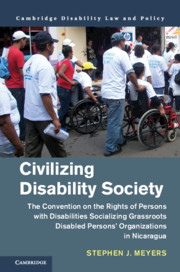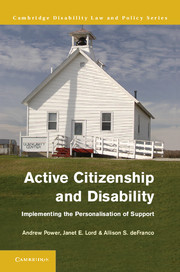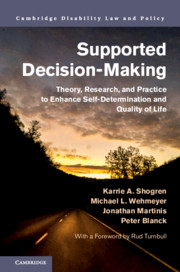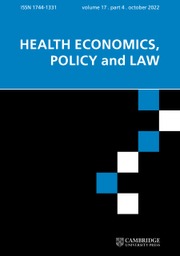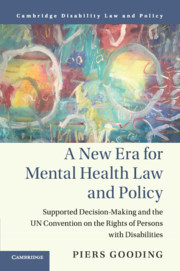
A New Era for Mental Health Law and Policy
Supported Decision-Making and the UN Convention on the Rights of Persons with Disabilities
Part of Cambridge Disability Law and Policy Series
- Author: Piers Gooding, University of Melbourne
- Date Published: October 2017
- availability: This ISBN is for an eBook version which is distributed on our behalf by a third party.
- format: Adobe eBook Reader
- isbn: 9781108515412
Find out more about Cambridge eBooks
Adobe eBook Reader
Other available formats:
Hardback, Paperback
Looking for an inspection copy?
This title is not currently available for inspection. However, if you are interested in the title for your course we can consider offering an inspection copy. To register your interest please contact [email protected] providing details of the course you are teaching.
-
The Convention on the Rights of Persons with Disabilities (CRPD) has generated new ideas and standards in healthcare and disability law and policy. In the mental health context, the CRPD directs governments to ensure people with mental impairments are treated equally before the law, including ensuring people have access to the resources necessary to enjoy their rights. But what this means in practice remains unclear. In addition, current domestic laws that authorise involuntary psychiatric interventions stand at cross-purposes with the CRPD, which requires respect for the 'will, preference and rights' of persons with disabilities 'on an equal basis with others'. This book explores the implications of the CRPD for law, policy and practice that respond to the complex issues raised by mental health impairment and disability. It argues that the support framework of the CRPD holds the potential to address persistent shortcomings in mental health law and policy.
Read more- Proposes a new approach to mental health and the law
- Promotes the application of international human rights law to mental health law, policy and practice
- Considers new solutions to longstanding problems regarding coercive mental health treatment
Reviews & endorsements
'Wonderful achievement, breaking new ground on the implications of the CRPD for mental health law, policy, and practice. A compelling resource for leaders with and without disabilities in the examination of human rights and personal autonomy as foundational elements for an inclusive world for all people.' Peter Blanck, Chairman Burton Blatt Institute, Syracuse University, New York, and author of eQuality: The Struggle for Web Accessibility by Persons with Cognitive Disabilities
See more reviews'This book is very timely, and with its professionalism and eloquence it will contribute vitally to much-needed discourse on mental healthcare and psychiatry in the post-CRPD era. Today, there remain so many myths and misunderstandings that have built up during long years of discrimination in the name of medicine and psychiatry - so much so, that many have become accepted as 'common sense'. There is an obvious need for basic changes in laws, policies and services, but firstly - in attitudes. This book will be extremely helpful to all those who are willing to make a change.' Dainius Pūras, UN Special Rapporteur on the right of everyone to the enjoyment of the highest attainable standard of health
'This book is a finely balanced analysis of the need to rethink mental health law, policy and practice from a human rights perspective. It is highly accessible, clear and well argued. It analyses the needs for reform and change, and the 'tremendous strategies … required to align law, policy and practice in the mental health context with human rights aspirations for the twenty-first century' (page 5). The author notes there are no absolute answers to contested questions including that of non-consensual psychiatric intervention. Piers Gooding writes with authority and provides a valuable resource for all who will be grappling with these crucial matters in the years ahead.' Helen Herrman AO, Professor of Psychiatry, Orygen, The National Centre of Excellence in Youth Mental Health, and Centre for Youth Mental Health, The University of Melbourne, Australia
'The book looks at how the CRPD and its articulation of autonomy, human dignity and solidarity provide a conceptual and practical alternative to existing mental health legislation. It challenges long-held views on mental health legislation and is a timely development given major issues facing mental health systems in Western high-income countries, on which the book concentrates.' Martin Curtice, The British Journal of Psychiatry
Customer reviews
Not yet reviewed
Be the first to review
Review was not posted due to profanity
×Product details
- Date Published: October 2017
- format: Adobe eBook Reader
- isbn: 9781108515412
- availability: This ISBN is for an eBook version which is distributed on our behalf by a third party.
Table of Contents
Introduction
Part I. What Do Human Rights Mean for Mental Health Law?:
1. Mental health law: purpose and procedures
2. Mental health, law and the United Nations Convention on the Rights of Persons with Disabilities: new tools or new paradigm?
3. Major criticisms of mental health law
Part II. The CRPD-Support Framework and Mental Health: New Tools or New Paradigm?:
4. The CRPD-support framework
5. Applying the CRPD-support framework in law
6. Practical examples of the CRPD-suport approach in the mental health context
7. Navigating the 'flashing amber lights' of the CRPD-support framework: addressing major concerns
Conclusion.
Sorry, this resource is locked
Please register or sign in to request access. If you are having problems accessing these resources please email [email protected]
Register Sign in» Proceed
You are now leaving the Cambridge University Press website. Your eBook purchase and download will be completed by our partner www.ebooks.com. Please see the permission section of the www.ebooks.com catalogue page for details of the print & copy limits on our eBooks.
Continue ×Are you sure you want to delete your account?
This cannot be undone.
Thank you for your feedback which will help us improve our service.
If you requested a response, we will make sure to get back to you shortly.
×
